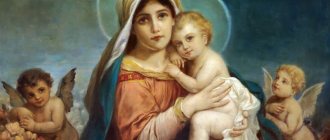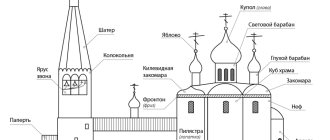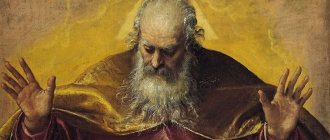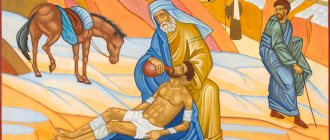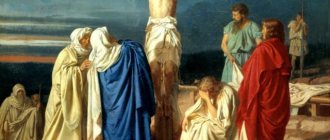The Divine and Human Origins of Christ
When studying the nationality of Jesus Christ, we should remember that He is the incarnate Son of God. That is, a Person possessing Divine and human natures at the same time. Saint Ignatius Brianchaninov teaches:
“Jesus Christ was born of the Virgin, one Person in two indivisible and unfused natures, Divine and human. The divine nature, despite Its infinity, did not destroy human nature. And human nature, despite its unfused existence, did not in the least constrain the infinity of the Divine nature” (Complete Collection of Creations, volume 4).
Icon of the Lord Jesus Christ
The Incarnation was necessary for the reconciliation of fallen humanity with the Creator, for the renewal of corrupt human nature. The conception of Christ was immaculate and occurred with the participation of the Holy Spirit in the womb of the Virgin Mary. Her formal husband (and therefore the imaginary father of Jesus) was the pious carpenter Joseph. It is possible to talk about the nationality of the God-man Christ only from the point of view of the origin of his earthly parents.
One mercy-dependent and mercy-loving race
Jesus was born a Jew—and with that came all the other parts of God's “unsearchable” and “unfathomable” wisdom—to achieve this goal. To silence all national and racial pride, including Jewish pride, and to bring every race and every ethnicity to humble trust in mercy.
Christ was born a Jew so that every race would rejoice because of mercy, not the amount of melanin; so that each ethnic group would be more pleased with mercy than with its ethnic traditions; and that every nationality should rejoice more because of mercy than because of national traits. Jesus was born a Jew to suppress all boasting of ethnic superiority. And in order to create one new, joyful and mercy-loving race.
By John Piper / © 2022 Desiring God Foundation. Website: desiringgod.org Translation - Anna Ivashchenko for
Donate Last: 02/28. Thank you!
Subscribe: Telegram • Facebook • • • Twitter • Instagram • Youtube
Genealogy and nationality of Jesus Christ
What is the nationality of Jesus Christ? Let us turn to the first lines of the New Testament. The Apostle Matthew calls Christ “the Son of David and the Son of Abraham” (Matthew 1:1), which indicates His Jewish origin. Abraham is an Old Testament prophet and the ancestor of God's chosen Jewish people (through his son Isaac). His descendant David is the king of Judah, who later became the ruler of the entire kingdom of Israel. Next, Matthew lists the genealogy of the Savior from Abraham to Joseph (Matt. 1:1-16).
Why does the Apostle Matthew mention Abraham and David separately from the other ancestors of Christ? It was these two Old Testament righteous people who were given the Divine promise (promise) of the appearance of the Savior in their family. The Almighty said to Abraham: “In your seed all the nations of the earth will be blessed” (Gen. 22:18). And to David: “Of the fruit of your womb I will place on your throne” (Ps. 131:11). Bishop Methodius (Kulman) explains why Matthew calls Christ first the Son of David and then the Son of Abraham:
“David was especially famous among the Jews because of the celebrity of his royal deeds. Moreover, David lived a thousand years after Abraham, and the promise given by God to David, as if recent, was on the lips of all the Jews. The promise given to Abraham applied to all tribes of the Jewish people. Whereas the promise given to David directly pointed not only to the tribe of Judah in general, but in particular to the family of David, from which the promised Savior was to be expected.”
Relatives of Christ
Why is the family of the Savior traced to Joseph, who, according to Christian dogmas, is not His father? This is because Jesus has long been perceived as the son of Joseph. Accordingly, he was the heir to the royal family to which Joseph belonged. During the earthly life of the Mother of God, it was impossible to talk about Her unmarried pregnancy. This would inevitably make people distrustful. First, the Jews had to be convinced that Jesus was the promised Messiah and Son of God. Only after this would they be able to accept the fact of His birth from a Virgin.
It is also customary for Jews to indicate their origin along the paternal line. Evangelist Matthew could not break this custom so as not to confuse his compatriots. In addition, Mary was also from the line of David. This means that the genealogy set out in the New Testament largely belongs to Her.
Why did He do this?
Now we can take a step back and ask the question: Why did God go to save His people of all nations, including the Jews, in such a circuitous way?
Let me summarize this workaround of God:
1. All of humanity fell into sin and corruption when Adam and Eve rejected the goodness of God for their own wisdom (Gen. 3:6; Rom. 5:12). When the various ethnic groups emerged in Genesis 10-11, all of their individual members were “children of wrath” (Eph. 2:3). No people on earth were worthy of God's blessing. Everyone deserved to be destroyed.
2. When God set in motion the plan of redemption for mankind, He chose Israel as the primary focus of His saving work for two thousand years (Deut. 7:6; Amos 3:2). This election of Israel was not connected with any characteristics of Israel that would make them worthy of other nations. Abraham was an idolater before God called him (Joshua 24:2,14). “So what? do we [Jews] have an advantage? Not at all. For we have already proved that both Jews and Greeks are all under sin” (Rom. 3:9).
3. For two thousand years, God offered salvation to Israel (Rom. 9:4-5) and foreshadowed the Messiah through Jewish history and Scripture (Luke 24:27). Their constant response was largely unbelief, as Stephen said: “Ye stiff-necked!...Ye always resist the Holy Spirit, even as your fathers do, and so do you” (Acts 7:51). Or as Paul said: “But concerning Israel he speaks [quoting the words of God from Is. 65:2]: All day long I have stretched out My hands to a disobedient and stubborn people” (Rom. 10:21).
4. The effect of this Jewish unbelief, notwithstanding its great advantages, was to show that the law, without a Redeemer, does not lead to justification, but only to the exposure and increase of sin (Rom. 3:20; 5:20). Because of this, every mouth is stopped. Therefore, if Israel, with all its advantages, “has not attained to the law of righteousness” (Rom. 9:31), other nations should not think that they are in a better situation. “But we know that whatever the law says, it speaks to those who are under the law, so that every mouth is stopped, and the whole world becomes guilty before God” (Rom. 3:19).
5. Through the incarnation, life, death and resurrection of the Messiah, the promises to the patriarchs were confirmed and mercy was opened to all nations. “Christ became a minister to the circumcision... to fulfill what was promised to the fathers, and to the Gentiles as a mercy, so that they might glorify God...” (Rom. 15:8-9).
6. There was a bitterness in Israel (Rom. 11:25; 2 Cor. 3:14) that continued into the 21st century. It will remain “until the fullness of the Gentiles is come in” (Rom. 11:25).
7. At this time - “the time of the Gentiles” (Luke 21:24) - there will be a great missionary movement to all nations. “And this gospel of the kingdom will be preached in all the world as a testimony to all nations; and then the end will come” (Matthew 24:14).
8. When “the fullness of the Gentiles has come in, ... all Israel will be saved” (Rom. 11:25-26).
9. Christ will return and establish His Kingdom (Rom. 11:26).
This is the bypass way that God planned to redeem His people from all ethnic groups, including the final conversion of “all Israel”—an entire generation en masse converted to faith at the end of time. Why was such a workaround needed? Here is Paul's short answer to Rom. 11:30-32:
“Just as you were once disobedient to God, but have now received mercy because of their disobedience, so they also are now disobedient so that you may have mercy, so that they themselves may also receive mercy. For God has imprisoned all in disobedience, that He might have mercy on all.”
Looking at this answer, we can say that:
The nations lived in disobedience after the Fall. That's why God chose Israel. Israel lived in disobedience despite all its privileges. Therefore, God was filled with mercy towards the pagan peoples. This mercy to the nations will lead to the great mercy of the conversion of Israel. Thus all nations are entirely dependent on grace and not on merit.
It's complicated. Strange. This is a workaround. So much so that the next thing out of Paul’s mouth was: “Oh, the depth of the riches both of the wisdom and knowledge of God! How incomprehensible are His destiny and unsearchable His ways” (Rom. 11:33).
The meaning of the genealogy of the Lord
The Apostle Matthew wrote the Gospel for the Jews. Therefore, the genealogy he presented is intended to inform the reader at the very beginning that Jesus Christ is a Jew from the line of David. That is, the One about whom the ancient prophecies speak. Archpriest Oleg Stenyaev notes that this was fundamentally important:
“The Jews would not recognize a Messiah who did not come from David and Abraham. The Jews also knew that the true Messiah was to be born in the very city where King David was born [Bethlehem].”
Protopresbyter Michael Theologian notes that the genealogy of Christ outlined by Matthew has an additional spiritual meaning. It seems to repeat the history of the preparation of the chosen people for the coming of the Savior. Moreover, in this list of names there are not only righteous people, but also sinful representatives of the family. Priest Viktor Ilyenko explains:
“Genealogy convinces us that Christ does not disdain sinners... That the depravity of his parents does not devalue his virtues... That even for the Lord Jesus Christ in pre-Christian humanity there was not an unbroken line of righteous people. It shows how difficult righteousness was to achieve then, which means that the coming of the Son of God into the world was necessary.”
The Bible tells us that Jesus Christ was not only a Jew ethnically, but also religiously. Soon after his birth (Luke 2:21), he was subjected to the traditional Jewish rites of circumcision and dedication to God (Luke 2:22-40). Jesus attended the synagogue (Luke 4:16) and honored the Old Testament Law (Luke 2:39).
"All Israel will be saved"
Some believe that this inclusion of Gentiles into the Jewish heritage is the final step in God's dealings with ethnic Israel. But that's not true. Paul teaches that when “the fullness of the Gentiles is come in,” then “all Israel will be saved” (Rom. 11:25-26). This refers to an entire ethnic group that will turn to Christ in the future - after “the fullness of the Gentiles has entered.”
Some say that the expression “all Israel” here does not refer to an ethnic group, but to the full number of the elect, Jew and Gentile. There are at least five good reasons why this is not the case. I will name two of them.
First, it is highly unlikely that in just eleven Greek words the meaning of the word “Israel” changed from “ethnicity/people” to “elect Jews and Gentiles” (Rom. 11:25-26). Almost everyone agrees that the word's first use refers to ethnic Israel. Therefore, of course, the second also applies to Israel: “...The hardening has happened in Israel in part... All Israel will be saved.” That is, “all Israel” is a people who were once partially hardened. One day this nation will be saved.
Secondly, the parallel between the two parts of Rom. 11:28 refers to “all Israel” as an ethnic group. The first part of verse 28 reads: “In regard to the gospel, they [the ethnic people of Israel] are enemies” of God. The second part of this verse says, “And in regard to election, [the same people who are enemies] are beloved of God for the sake of their fathers.” The point of this verse is to show that even though ethnic Israel is now a covenant-breaking, unbelieving people, this will change. The people who are now the enemy will later be converted by reason of election and love. (See parallels in Romans 11:12,15.)
Is the nationality of the Savior so important?
So, the Gospel of Matthew clearly speaks of the Hebrew origin of Christ. But, as already mentioned, this apostle needed to convince the Jews of the fulfillment of the prophecies and the coming of the Messiah. For a modern Christian, it is much more important to remember not about the nationality of the Lord, but about the significance of His coming into our world. Therefore, more relevant for us is the genealogy of Christ, set forth by His other disciple, Luke. It was written not to Jews, but to foreign pagans, for whom Jewish prophecies had no meaning.
Luke traces the genealogy of Christ back to the very first man in history – Adam (Luke 3:23–38). Thus, the evangelist places emphasis not on the nationality of Christ, but on the common origin of all people. The Lord is not only the son of Abraham and David, but also the son of Adam, like each of us. This is the Son of man. And He came to save not only the Jews, but all nations. Archpriest Vyacheslav Reznikov notes:
“Other nations have every right to call Jesus Christ their King, their Lord and God. And at the same time - my brother. There is a deep truth in the fact that the icon of Jesus Christ has its own national characteristics among different nations. For the Japanese, He looks like a Japanese, for blacks, he looks black. Thus, everyone says: God became a man precisely for my sake, and therefore became like me.”
Why was Jesus Christ's nationality predetermined?
At the same time, it is necessary to understand that Jesus Christ - the Savior not only of the Jews, but of all humanity - could only be born among the chosen Israeli people. His election by God consisted precisely in preparing the coming of the Lord into our world. After all, the Incarnation could only occur in the womb of the Immaculate Virgin. She, in turn, could only be born among a people who were separated from pagan tribes and kept faith in the One True God. Orthodox theologian Alexey Osipov notes:
“There is no election without a goal. The chosen one is the one who is able to complete the assigned task. And the Jewish people were chosen as the most capable of preserving the most important Revelation to humanity about the coming to Earth of the Savior of the world - Christ, Who will free man from slavery to sin."
The ultimate goal: everyone humbly trusts in mercy
What is the ultimate goal of this roundabout way of salvation? Paul puts it this way: “For God has imprisoned all in disobedience, that He might have mercy on all” (Rom. 11:32). Paul had already said that the goal was that “every mouth might be stopped, and the whole world might become guilty before God” (Rom. 3:19). This is a negative goal. Each ethnic group humbled itself because of its disobedience.
The Jews humbled themselves because, despite their advantages, they were like broken branches, and the Gentiles took their place in the Abrahamic covenant only by faith (Rom. 11:19; 9:30-31). The Gentile nations humbled themselves because they held on by faith alone (Rom. 11:20), and because it was the Hebrew root that sustained them, and not the other way around (Rom. 11:18). You need to become a “Jew” to be saved (Gal. 3:7). But no Jew is saved because of his ethnicity. “For not all are Israelites that are of Israel” (Rom. 9:6). “And do not think to say within yourself, ‘We have Abraham as our father,’ for I tell you that from these stones God is able to raise up children for Abraham” (Matthew 3:9).
Every mouth is blocked. The pride and boasting of every ethnic group fell silent. All are locked in disobedience. Everyone is forced to swallow their pride. Gentiles must become Jews (including Nazis and Ku Klux Klan members) in order to be saved. The Jews must renounce all confidence in their Jewishness and join the Gentiles in their dependence on mercy.
Star of Bethlehem
On the very night when Christ was born, a bright, unusual star appeared in the sky. The Magi, who studied the movements of celestial bodies, went after her. They knew that the appearance of such a star spoke of the birth of the Messiah.
The Magi began their journey from an eastern country (Babylonia or Persia). The star, moving across the sky, showed the sages the way.
Meanwhile, the numerous people who came to Bethlehem for the census dispersed. And Jesus' parents returned to the city. The star stopped over the place where the baby was, and the wise men went into the house to present gifts to the future Messiah.
They offered gold as tribute to the future king. They gave incense as a gift to God (incense was still used in worship back then). And myrrh (fragrant oil with which they rubbed the dead), as for a mortal person.
King Herod
The local king Herod the Great, subordinate to Rome, knew about the great prophecy - a bright star in the sky marks the birth of a new king of the Jews. He called to him the magicians, priests, and soothsayers. Herod wanted to know where the baby Messiah was.
With deceitful speeches and deceit, he tried to find out the whereabouts of Christ. Having not received an answer, King Herod decided to exterminate all the babies in the area. 14 thousand children under the age of 2 were killed in and around Bethlehem.
However, ancient historians, including Josephus, make no mention of this bloody event. This may be due to the fact that the number of children killed was much smaller.
It is believed that after such an atrocity, the wrath of God punished the king. He died a painful death, eaten alive by worms in his luxurious palace. After his terrible death, power passed to the three sons of Herod. The lands were also divided. The regions of Perea and Galilee went to Herod the Younger. Christ spent his life in these lands for about 30 years.
Herod Antipas, tetrarch of Galilee, beheaded John the Baptist to please his wife Herodias. The sons of Herod the Great did not receive the royal title. Judea was ruled by a Roman procurator. Herod Antipas and other local rulers obeyed him.
When was the first icon?
The oldest icons that have come down to us date back to the 6th century and were made using the encaustic technique on a wooden base, which makes them similar to Egyptian-Hellenistic art (the so-called “Fayum portraits”).
Interesting materials:
How to block all numbers starting with the same? How to order Izy's number? How to order a Life number? How to paint over car license plates in a photo on an iPhone? How to sign up for MFC by phone number? How to register a number on WhatsApp? How to register a Vodafone number? How to call landline numbers from MTS? How to call a landline number in Germany? How to call a number in GTA 4?
